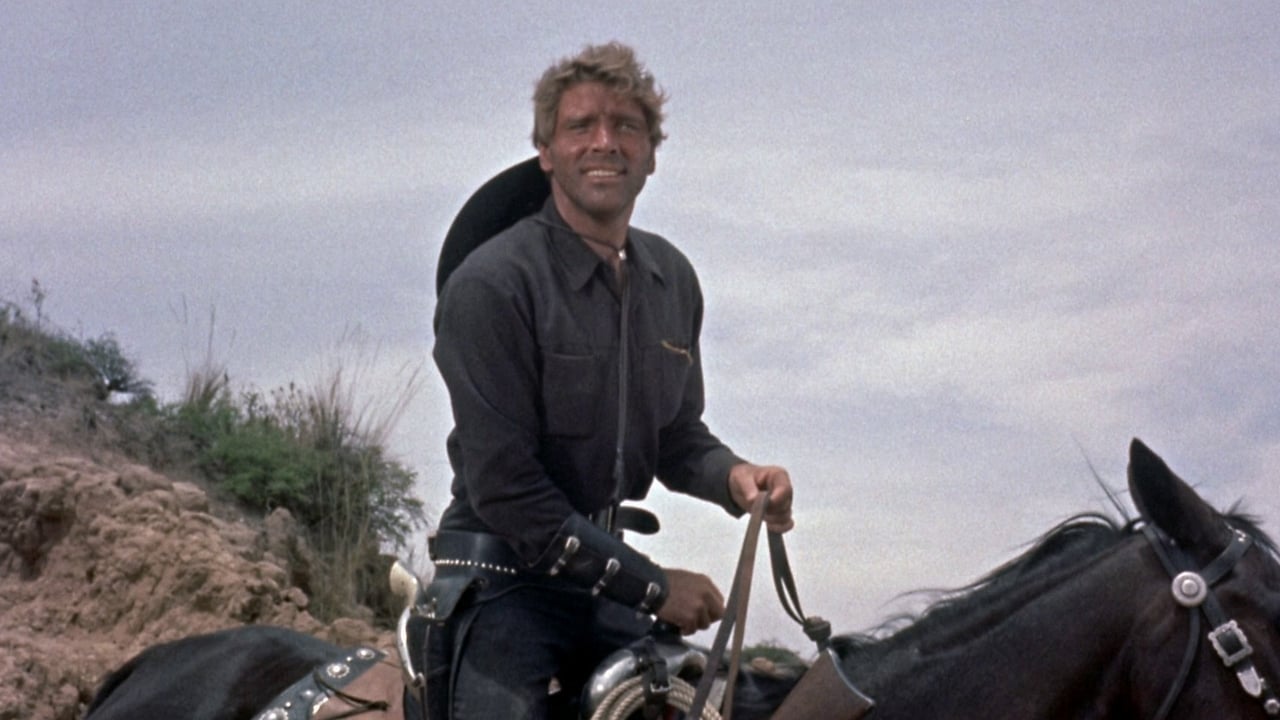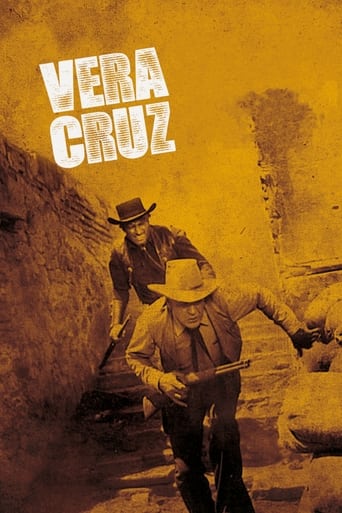

Does every reviewer notice Burt's shiny new teeth ? They do seem to be part of the plot, which is otherwise in need of some cleaning up. Not that this matters, because the action is fairly entertaining anyway, in a shallow kind of way. Not too long. Amusing incidents. Lots of wild shooting, and inventive direction. Interesting pyramidal Mexican scenery. The main female lead is not great, however, and there is not enough of young Buchinsky, although he does play his harmonica. I thought the ending was definitely original, and a surprise, as Burt suddenly seems to turn against the type he's been playing. Perhaps it's because Gary had saved his life, and I guess he owed him. Perhaps his gun was just empty. Why did he replace it in its holster ? I couldn't figure it out. Had he aimed to miss ? What was Gary thinking when he chucked Burt's gun ?
... View MoreGary Cooper plays Benjamin Trane, and Burt Lancaster plays Joe Erin in director Robert Aldrich's western set in the Mexican rebellion of 1866, where the actors play American mercenaries who are hired by Emperor Maximilian to escort a countess on her way to Vera Cruz, ostensibly for her safety, but they soon find that her carriage conceals a fortune in gold. This is too much for Joe, who is a ruthless killer to Benjamin's gentleman, so the two men will engage in a showdown for the money and the countess. Ernest Borgnine & Charles Bronson costar.Mediocre film has a good cast but unappealing characters and a story that just isn't that compelling.
... View More"Apache" director Robert Aldrich's "Vera Cruz" is interesting not only as an incomparable example of a western—one that Sergio Leone claims inspired him—but also for the headaches that it created for both Mexican officials as well as Hollywood filmmakers who went south of the border searching for atmospheric locations. Unlike previous westerns, Aldrich and co-scenarists Roland Kibbee and James Webb, working from a Borden Chase story, made one of the earliest soldier-of-fortune oaters with heroes who display proficiency with firearms of any kind and can hit well-nigh impossible targets. Interestingly, Gary Cooper plays the sainted good guy hero, while leering Burt Lancaster portrays the lusty anti-hero. These two drifters form an uneasy alliance against both the Mexicans and the French. Unfortunately, the depiction of Mexicans was so racist that Hispanic audiences rioted in the theaters. Reportedly, some spectators tore their chairs out of the floor and hurled him contemptuously at the screen. Mexican officials changed their way of dealing with American filmmakers after the "Vera Cruz." A censor was assigned to films thereafter and they sought to stress the innate dignity and superiority of Mexicans over everybody else. "Vera Cruz" opens with the following written prologue: "As the American Civil War ended, another war was just beginning. The Mexican people were struggling to rid themselves of their foreign emperor—Maximilian. Into this fight rode a handful of Americans—ex-soldiers, adventurers, criminals—all bent on gain. They drifted South in small groups. And some came alone." Former Confederate colonel Ben Trane (Gary Cooper of "High Noon") enters Mexico, but his horse goes lame. He reins up at a cantina and admires two horses. The owner of one of the horses, Joe Erin (Burt Lancaster of "Brute Force"), walks outside about the time that Ben is appraising the horses. Joe sells him the other horse for $100 in gold. No sooner have they hit the trail than a column of mounted Austrian lancers pursues them. Ben displays his incomparable marksmanship at full gallop and shoots the gun out of a soldier's fist. Ben doesn't understand all this hostility until Joe informs him that the soldiers are chasing them because Ben is riding the commander's horse. The lancers dismount and fire a volley at Ben. He plunges his horse before the bullets strike him. Erroneously, Joe believes Ben is kaput and loots his horse. When Ben tries to loot the old colonel, the wily Southerner surprises him with a six-gun in the stomach. Ben appropriates Joe's horse and leaves him afoot. Not long afterward, they encounter each other again in the same Mexican town, and Joe convinces Ben to join them to fight in the revolution. Ben explains, "I lost everything but my shirt in the civil war." Together, they ride with Joe's men to a rendezvous with the Emperor Maximillian's envoy, Marquis Henri de Labordere (Caesar Romero of "The Cisco Kid and the Lady"), and everybody gets a surprise when a revolutionary Juarista general, Ramirez (Morris Ankrum of "The Saracen Blade), arrives to make his own offer. Ramirez orders his soldiers to show themselves, and the walls surrounding the area where Ben, Joe, and the others are bristle with armed Mexican natives. This showdown scene is a lot like the finale in "Butch Cassidy and the Sundance Kid." Joe exploits the moment when Ben spots a group of children. Ben suggests they get the children to safety, and Joe orders Donnegan (Ernst Borgnine of "The Dirty Dozen") and Pittsburgh (Charles Bronson of "The Magnificent Seven") to get the kids into the church. Joe uses the welfare of the children to compel Ramirez and his army to withdraw. Labordere tells Ben and Joe they can ride with them to Mexico City to discuss terms with the Emperor.In Mexico City, Ben and Joe show off their skills with both rifles and six-gun. The imperialist Emperor Maximillian (George Macready of "Coroner Creek) and Labordere enlist them to act as an escort for Countess Marie Duvarre (Denise Darcel of "Tarzan and the Slave Girl") for her trip to Vera Cruz. Maximillian and Labordere have no intention of paying them. During the journey on the first day, Ben and Joe both notice the deep wheel ruts that the carriage hauling the countess makes at a river crossing. Later, after they have put up for the evening, Ben and Joe discover a concealed compartment in the floor of the coach that yields a small fortune in gold. "Each of one of those six boxes contains a half-million dollars in gold," Countess Duvarre informs them after she finds them in the stable with the wagon. She explains that the gold will be used to hire mercenaries. It is important to notice that the anti-heroic Lancaster hero has changed out of his black shirt into a white shirt when they embark on escort duty. Symbolically, this means that Joe is showing a little goodness. Later, when he betrays Ben, and they shoot it out with predictable results, Joe is dressed in solid black from head to toe. Anyway, the three of them plot to steal the gold and share it. Meanwhile, the Juaristas are shadowing their every move. Eventually, a pretty Juarista, Nina (Sara Montiel of "Run of the Arrow"), makes friends with Ben. Ben decides that he must switch sides and convinces Joe to make the change.Lancaster's own company, Hecht-Lancaster Productions, produced "Vera Cruz" on a $1.7 million budget. Despite uniformly negative reviews, "Vera Cruz" coined more than $11 million worldwide. The amorality of the characters, especially Lancaster's lascivious villain, along with the surfeit of violence, makes this abrasive western a prototype for Spaghetti westerns. It is amazing that some of the violence survived the Production Code Administration censors, particularly when Joe kills a helpless lancer with his own lance. Cooper and a charismatic Lancaster make a strong pair of heroes who cannot trust each other. Aldrich directed flawlessly, and this lively 94-minute, Technicolor western never wastes a second.
... View MoreAs I recall, the theatre was packed even down to the front row with a lot of noisy guys. Word around high school was that this was a really cool Western. Of course, it wasn't the kind of Western we were used to in 1954. Instead of the usual cowboy types, there were Cooper and Lancaster who may have worn cowboy hats, but were riding around with a lot of stiff-looking soldiers in dressed-up uniforms and a lot of little brown guys in white pajamas. But who cared when there was all that great action with thousands of guys shooting it out in big screen Technicolor. Then too, there was all that great scenery that didn't look like the usual cowboy towns and open spaces we were used to. Sure there had to be a story, something about gold coins, a funny looking stagecoach, and who gets to keep the coins everyone's fighting over. Seemed like the dressed-up soldiers wanted to keep their guy king and probably get their fancy uniforms pressed, while the guys in rags wanted their own guy king and probably get some better clothes. As I recall, I was rooting for Lancaster since he did all the great jumping around and had table manners a lot like mine. But everybody knew that Cooper always stood for everything that's right, so he would be on the winning side whichever side that was. But it was weird seeing this Negro with the white guys just like he was one of them. You just didn't see Negroes in Westerns, except maybe as servants in a big house. Actually, I was kind of glad when the little guys won because they looked like they really needed the money. Too bad about Lancaster, but you know that anyone who grins all the time can't be trusted. Still, seeing all those dead guys with the women crying over them did make me think all the shooting might not be so fun after all. I didn't know it then, but I guess a lot of big time movie guys as far away as Italy really liked the movie too. It gave them ideas, so they made their own versions that also made a lot of money. I guess that's the way the business works. Anyhow, that was 50-some years ago. Naturally, I don't think quite the same way today. But I think I can still say it anyway—Great action movie then, great action flick now.
... View More